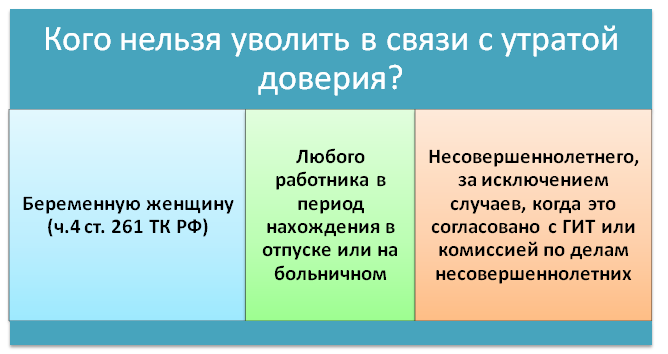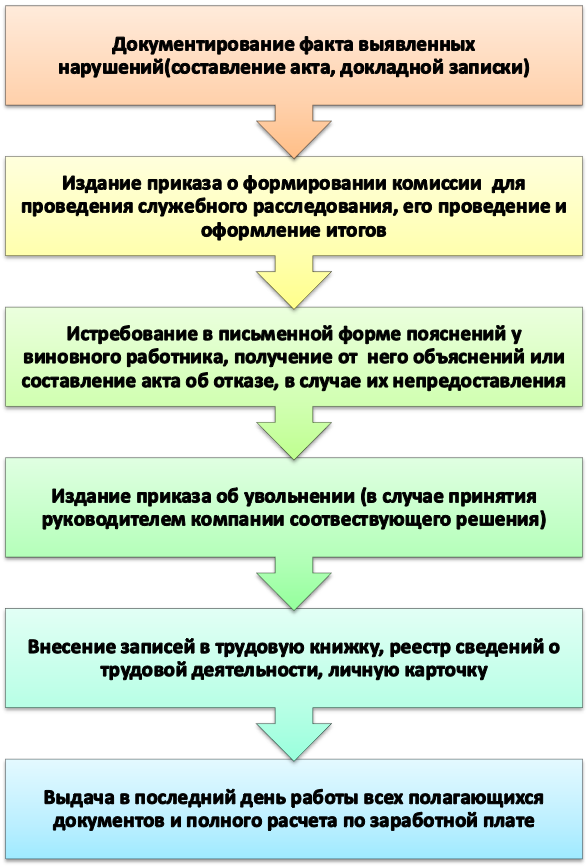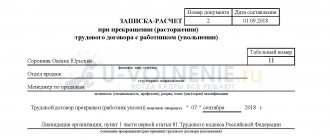Who and in what cases can be fired due to loss of trust?
An employer may dismiss due to loss of trust on the basis of clause 7, part 1, art. 81 of the Labor Code of the Russian Federation only if a number of mandatory conditions . To do this, you must have documentary evidence of the following facts:
- The employee is responsible for posting, accounting, issuing, and ensuring the safety of money or inventory items. This fact must be stated in an employment contract, an agreement on full financial responsibility (Part 2 of Article 57, Article 244 of the Labor Code of the Russian Federation);
When concluding an agreement on liability, it must be taken into account that it can only be applied to employees employed in certain positions (Resolution of the Ministry of Labor dated December 31, 2002 No. 85).
- the employee committed illegal actions that provide sufficient grounds for the employer to lose confidence in him (clause 45 of the resolution of the Plenum of the Supreme Court of the Russian Federation dated March 17, 2004 No. 2). Such misconduct may occur both on and off . They may also not be related to the performance of official duties (for example, a court verdict for theft or drug distribution). A clear list of such actions is not regulated and remains at the discretion of the employer ;
- the offender does not belong to the category of persons with whom it is prohibited to terminate the contract on the basis of loss of trust.

Dismissal for guilty actions is an extreme and not the only measure of punishment on the part of the employer. He may , but is not obligated to, apply it. Perhaps the employer will decide to apply a milder measure of restraint in the form of a reprimand or reprimand.
The burden of proving the employee's guilt lies with the employer . However, for example, if a shortage is discovered, if the conclusion of an agreement on full financial liability with the person who committed it is justified, it is the offender who must prove the absence of his guilt in the loss or damage of property (clause 4 of the resolution of the Plenum of the Armed Forces of the Russian Federation dated November 16, 2006 No. 52).
Dismissal due to loss of confidence in 2021: reasons, registration procedure
One of the grounds for dismissal at the initiative of the employer is loss of confidence in the employee. In the overwhelming majority, it applies to civil servants and military personnel and requires special procedural measures.
Knowing the procedure for dismissal and the form of termination of employment at one's own request is necessary to protect one's labor rights, since practice shows that often the employer does not fully comply with the requirements of the law, thereby infringing on the interests of the employee.
Regulatory regulation
Regulatory regulation of dismissal due to loss of confidence is presented, first of all, by the Labor Code of the Russian Federation:
- Art. 77 – where the grounds for termination include “employer’s initiative.”
- Art. 81 – the specified basis is established in a separate paragraph.
- 1 – procedure, if not followed, the dismissal will be declared illegal and the employee reinstated.
Next, you need to turn to the Federal Law “On State Civil Service”, which also has a separate article devoted to this basis (Article 59.2). The act discloses cases in the event of which a person is subject to dismissal due to loss of confidence.
Similarly with the civil service in the Federal Law “On Military Duty and Military Service” in Art. 51 establishes this basis, which reveals the facts, upon the occurrence of which, a person is subject to dismissal due to loss of confidence.
Industry-specific federal laws regulating the activities of a particular body (Investigative Committee, prosecutor's office, police, etc.) also regulate dismissal due to loss of trust.
Who can be fired on this basis?
Considering the subject composition to which the analyzed basis is applicable, for simplicity we will divide them into 4 groups.
- Employees whose work activity is related to material assets.
- Civil servants.
- Military personnel.
- Law enforcement officers (Ministry of Internal Affairs, Investigative Committee of Russia) and the prosecutor's office.
A distinctive characteristic of the first group is an agreement on financial liability, that is, these are those employees who are directly related to the circulation of funds and material assets.
A classic example would be a pawn shop employee.
But to an employee of the financial department (accountant), who seems to be associated with material assets, but only “on paper,” this ground for dismissal cannot be applied.
Labor legislation establishes a general ban on dismissal on this basis:
- Persons on leave, not only annual paid leave, but also other types (for example, educational leave).
- Employees who are temporarily disabled, that is, on sick leave.
- Workers – pregnant women.
Interestingly, it doesn't matter whether the employer knew about it. If this circumstance is established, he is obliged to reinstate the employee at work until the birth of the child.
In relation to minors, in order to maximize the protection of their rights, an additional procedure is provided, which is complicated by obtaining the conclusion of the State Tax Inspectorate and the Commission on Minors' Affairs.
Facts that, if revealed, may lead to dismissal of an employee
Before dismissing an employee on such grounds, the manager must carefully check all the facts, and if they are confirmed, initiate the procedure for terminating the employment contract.
In the Labor Code, the basis for dismissal is “committing guilty actions.” It is the determination of guilt that is one of the difficult issues.
In the classical sense, such actions include:
- Acts related to various forms of theft (embezzlement, embezzlement, theft, etc.).
- Loss of money and material assets.
- Actions that create a threat of theft or loss.
As actions that create a threat, we can consider the activities of a warehouse security guard who fell asleep while on duty. These actions did not entail the consequences described in paragraphs 1 and 2, but created a threat to their occurrence.
Consider terminating a contract due to loss of trust with a government employee. The law establishes an exhaustive list of what may cause a loss of trust, including:
- Unresolved conflict of interest.
- Failure to provide a completed declaration of income, expenses and property at all or incompletely.
- Participation in the management of a commercial enterprise.
- Engagement in entrepreneurial activity.
- Availability of accounts in foreign banks.
- Participation of civil servants in the management of public and political organizations. For example, it is prohibited to be the chairman of a branch of any party.
Dismissal procedure
The dismissal procedure can be divided into 2 different groups: when violations are related to the performance of official duties and proceedings are necessary, as well as cases when a person can be dismissed if the fact is recognized by the court.
In general, regardless of the legal nature, the dismissal procedure is the same:
- Recording violations. Can be in any form available for preservation for a long time. A classic report is a report addressed to the manager from an employee who learned about it. If a violation is detected using video recording, it is recommended to write a report briefly summarizing the essence of the act with the video recording attached.
- Creation of a commission to investigate non-compliance with prohibitions and obligations and direct work to establish the circumstances. The commission must include at least 3 people who are disinterested.
Thus, in one of the decisions, the court pointed out the inconsistency of the commission, since it included a deputy of the person in respect of whom the audit was carried out. The court based its arguments on the fact that when a boss is dismissed, his deputy is the first person to fill the specified position, and therefore has an official interest.
Based on the results of the investigation, a document is drawn up and approved by all members of the commission. The report must reflect the facts indicating violations, the degree of guilt and the proposed punishment, after which it is handed over to the employee in respect of whom this was carried out for review.
- The employee is asked to provide an explanation of the identified violations within 2 working days.
- Issuance of an order for disciplinary action, with a detailed indication of the person’s guilt.
- Issuance of a dismissal order.
- Make the necessary settlement with the former employee.
It is important that if an employee has been found guilty of violations (by a court decision) by a body or official, an investigation is not required; this position was expressed by the Plenum of the RF Armed Forces in one of its resolutions.
Deadlines
It is necessary to understand that the current law sets deadlines for the dismissal of a person due to loss of confidence.
The dismissal of an employee must take place no later than 1 month from the date of discovery and 6 months (2 years based on inspections and audits) from the date of occurrence.
In the event that the termination of the contract is not carried out due to an investigation by the employer, the period is 1 year.
Illegal dismissal
In the event that an employee believes that his rights have been violated, he has the right to resort to their protection as follows:
- Judicial order.
- Administrative.
In court, the person demands that the dismissal be declared illegal and reinstated at work. It is important to immediately note that civil servants, military personnel, prosecutors and other persons appeal orders of dismissal in accordance with Chapter 22 of the CAS RF.
In addition, if the court finds the dismissal illegal, the employee is due payment for forced days of absence and legal costs.
In an administrative manner - contact the prosecutor's office, as well as the State Inspectorate, which will conduct an inspection, and based on its results, the employer may be held administratively liable under Art. 5.27 Code of Administrative Offenses of the Russian Federation.
List of conditions for dismissal due to loss of confidence for civil servants
Unlike employees of commercial organizations, for state civil servants certain special circumstances are prescribed that give management the right to dismiss due to lack of confidence in the worker (Article 59.2 of the Federal Law of July 27, 2004 No. 79-FZ). These include:
- failure to provide or distortion of information about property and income received by a civil servant or members of his family;
- participation on a paid basis in the management of commercial structures;
- detection of a conflict of interest of an employee - if he did not report it and did not take measures to eliminate it;
- conducting business activities by government employees;
- entry of an employee into the management bodies of foreign non-profit organizations;
- violation of the ban on the use of foreign financial instruments or bank accounts.
What is the procedure for dismissal due to loss of confidence?
The general procedure for dismissal due to loss of confidence must be applied taking into account compliance with the procedure for bringing to disciplinary liability (Articles 192 and 193 of the Labor Code of the Russian Federation).

In this regard, the main restrictions that apply to such actions by the employer are as follows:
- application is possible within 1 month from the date of detection of the violation;
- The employer may exercise his right to dismissal no later than six months from the date of the commission of the offense.
In order to lawfully dismiss for loss of trust, it is necessary to responsibly approach each stage of the procedure. Especially at the stage of collecting evidence of the employee’s guilt.
How to fire an employee due to loss of trust
One of the reasons for dismissal may be loss of confidence (clause 7, part 1, article 81 of the Labor Code of the Russian Federation). This procedure has a number of features, and it is important to do everything correctly so as not to subsequently prove your case in court. Let's look at the whole complex process step by step.
Who can and cannot be fired due to loss of trust
You can fire an employee who works with monetary or commodity valuables for loss of trust if, as a result of his actions, the employer no longer trusts him. A direct relationship to the maintenance of valuables should be enshrined in an employment contract, an agreement on full financial responsibility or in a job description.
But even if guilt is proven, you cannot fire:
- pregnant employee;
- temporarily absent employee (the employee can be dismissed after he returns to his work duties);
- a minor in the absence of the consent of the labor inspectorate and the commission on affairs of minors and the protection of their rights.
Reasons for loss of trust
Dismissal due to loss of trust is possible if the employee caused direct damage to the employer’s property, that is, the available property decreased in quantity or its condition worsened. In this case, the perpetrator will have to compensate for the restoration or fully compensate for the damage. But remember that lost profits cannot be recovered.
In addition, an employee can be fired due to loss of confidence if he has committed illegal actions not related to the performance of official duties. In this case, the employer must establish the fact of the crime and receive a copy of the court verdict that established the employee’s guilt.
How to fix the bases
Dismissal due to loss of confidence is a set of actions that must be strictly followed in order to avoid violation of labor laws.
If an employee has committed actions related to the performance of job duties, his dismissal is a disciplinary measure. When terminating an employment relationship on this basis, it is necessary to strictly follow the disciplinary procedure established by the organization, including deadlines.
The manager must require a written explanation from the employee. The form of explanation is not established by labor legislation.
If the employee is ready to write an explanatory note, there is no need to require him to give an explanation in writing.
If the situation is conflicting, then the notification must be issued in writing and handed to the subordinate against signature. If you refuse to sign, a document is drawn up.
The legislation gives the employee two working days to provide explanations. The period is counted from the date following the day the claim is submitted.
Procedure for registering dismissal
Dismissal due to loss of confidence, the procedure for the employer's actions that must be carried out, is provided for in Article 193 of the Labor Code of the Russian Federation:
- detection and recording of employee’s guilty actions;
- an official investigation;
- receiving a written explanation from the employee;
- act on the results of the internal investigation;
- issuance of an order;
- dismissal.
Step-by-step procedure
Step 1. The employer records the fact of committing guilty actions in the form of an internal memo or report, since there is no unified form.
Step 2. The employer, by order, creates a commission to conduct an internal audit consisting of at least three people. The order records the date, purpose of the creation of the commission, its powers, the period of its activity, full name. and the positions of the employees included in its composition. Members of the commission get acquainted with the order against signature.
Download
Step 3. The commission establishes the fact of committing guilty actions, the time, place, method, cost of damage, establishes the specific culprit and the degree of his guilt, and stores the materials of his investigation.
Step 4. The employer requires a written explanation from the employee, which is provided within two working days. If there is a conflict, the employee must be notified in writing of the need to provide an explanation. In the absence of explanations, the manager draws up an act of refusal to provide them.
Step 5. The commission records the results of the investigation in a report. There is no standardized form for this document. In addition to the results and conclusions about guilt, the act contains proposals on the punishment of the employee (if there is evidence of guilt). All members of the commission sign the act.
Step 6. Based on the results of the inspection, the employer issues a dismissal order with reference to clause 7, part 1, art. 81 Labor Code of the Russian Federation. The employee gets acquainted with the order against signature within three working days from the date of publication. The employer records the refusal to familiarize himself with an act.
Download
Step 7. The employer fires the employee due to loss of trust:
- no later than 1 month from the date of discovery of the misconduct (illness or vacation are not included in the calculation of the period);
- no later than 6 months from the date of commission of the offense, but if the fact was discovered during an audit or inspection - no later than two years from the date of commission;
- no later than one year from the day the employer learned of the misconduct, if the actions were not committed at the place of work or in connection with the performance of his duties.
How to document a violation
There is no clear, legally regulated form of document to reflect the discovered fact of violations committed by an employee . As a rule, this is a memorandum in free form, including:
- identification data (full name, position) of the initiator of the document that discovered the violation;
- a description of the facts identified and the conditions under which they were committed;
- date and personal signature of the compiler.
If the violation took place outside the employer's territory, he will receive documents from investigative authorities or from the court. does not need to compose anything additional .
How to conduct an investigation and document its results
To confirm the detected violations, a commission is created for an internal investigation. It should include who are not interested in the outcome of the proceedings. Its number is at least 3 people . To do this, issue an order in any form, which indicates:
- positions and names of persons involved in clarifying all the circumstances of the offense;
- powers of commission members;
- objectives of the investigation;
- its duration.
The commission must:
1. Identify all the conditions under which the violation was committed.
2. Establish a list of valuables that are lost or damaged.
3. Inspect the place where the violation occurred.
4. Assess the amount of direct actual damage.
5. Identify the guilty employees and obtain evidence of their guilt.
6. Establish the circumstances that contributed to the commission of the offense.
All members of the commission are introduced to the order against signature.
Based on the results of the actions taken, an act is drawn up. It provides the following information:
- a list of employee actions that give grounds for mistrust;
- conditions for committing unlawful acts;
- the amount of damage caused or possible damage caused by them;
- the degree of guilt of the employee and proposals for applying punishment to him.
The act is signed by all members of the commission, and the employee gets acquainted with it against signature. If he refuses to familiarize himself, this is also documented in a separate act.
Dismissal due to loss of confidence
When concluding an employment contract, trust between the employee and the employer is assumed and is rarely specified in a separate clause.
Legal relations of an official nature are subordinate and assume that the employee follows legal orders, the order of the head of the enterprise or department.
The legality of the actions of the parties to labor relations is justified by the Labor Code of the Russian Federation, special regulations of a general and local nature. Dismissal under the article “loss of trust” is permitted in exceptional cases.
Grounds for dismissal
Termination of an employment contract is possible when the employee has been entrusted with monetary or material assets, and if the employee has committed theft in the company, or by other actions has jeopardized the financial well-being of the entrepreneur or his counterparties; contributed to the commission of crimes - by his inaction he caused large shortages, losses to the organization, etc.
Termination of an employment agreement is carried out at the initiative of the employer - according to the Labor Code of the Russian Federation, Art. 81 (clause 7 part 1). The fact of servicing monetary or material assets must be indicated in the employment contract.
It is possible to conclude an additional agreement on the employee’s financial liability.
The extent, limits, and consequences of such responsibility for the accountant, seller, cashier, storekeeper, forwarder and other employees who deal with the company’s financial assets and take care of their safety are indicated.
The grounds for dismissal of an employee are the employee’s guilty actions, i.e. verified facts of theft or the risk of committing an offense due to official negligence, neglect of one’s duties specified in the employment contract.
The Labor Code of the Russian Federation identifies categories of employees to whom disciplinary action in the form of “dismissal due to loss of confidence” cannot be applied.
These include pregnant women (subject to appropriate documentary evidence from a medical institution).
It is also prohibited to fire a minor employee; To terminate an employment contract, you will need the written consent of the commission for minors, as well as the labor inspectorate.
Important! It is prohibited to dismiss an employee during sick leave, i.e. temporary disability of an employee when he is undergoing outpatient or inpatient treatment.
The procedure for terminating an employment contract is excluded if the employee is on a planned vacation or on paid leave at his own request.
You can begin dismissal after the employee has completed sick leave or returned from vacation.
Before dismissing an employee due to loss of trust, it is necessary to determine the basis fact: that the employee actually worked and (or) continues to work with material, financial and commodity assets.
This is determined by the specifics of the employee’s job activity, his profession, rights, and responsibilities specified in the employment contract. Other facts of loss of trust are due to special regulations, codes of ethics for public servants - civilian, military officials, police officers.
Then the grounds for dismissal are determined by the norms of these laws and are not directly regulated by the Labor Code.
List of employee’s guilty actions
The Labor Code of the Russian Federation and other special acts do not provide a complete list of actions that may lead to the dismissal of an employee due to loss of trust. It is possible to terminate an employment contract at the request of the employer if the fact of a disciplinary offense is revealed and the procedure for bringing the guilty employee to justice is followed.
The list of grounds for dismissing an employee - due to distrust of him on the part of the employer - includes the following actions:
- which resulted in the loss or theft of the company’s material assets: equipment broke down, money disappeared from the cash register, safe deposit box, safe, etc. – such facts may become grounds for dismissal of an employee, including with the participation of the courts.
- threat of theft - if the employee did not take the measures necessary to preserve the organization’s money and property, ignored his immediate job responsibilities, left valuable property unattended, etc.
- bribery, fraud, commercial bribery, an official going beyond the limits of regulated powers - concluding transactions bypassing the enterprise, transferring funds to the accounts of shell companies, dummy individuals.
Dismissal may also follow if the above actions were not committed at the workplace. The Resolution of the Plenum of the Armed Forces of the Russian Federation No. 2 of 2004 states that they must be of a selfish nature, i.e.
committed for the purpose of obtaining illegal personal gain, profit, bypassing the interests of the employer or to the detriment of the company’s reputation.
For specialists not associated with financial responsibility, dismissal may follow if the official committed an act that discredits the civil service, representatives of law enforcement and military structures.
Procedure for dismissal due to loss of confidence
If it turns out that the employee’s guilt is due to his dishonest performance of his official duties, then termination of the employment contract is possible as liability for a disciplinary offense. The grounds for applying penalties are established by the Labor Code of the Russian Federation - Art. 193.
Evidence will be required to confirm that the employee actually committed actions that resulted in a loss of trust. If the head of the company decides not to write a statement to the police, then he must initiate his own investigation.
The employer has the authority to create a special commission, which includes authorized officials of the enterprise, auditors, and experts.
The basis for starting the dismissal procedure may be a memo from the boss under whose subordination there is an employee who has committed a disciplinary offense associated with loss of trust.
During the investigation, an inventory may be carried out necessary to establish the fact of theft and (or) shortage.
Before the procedure, you can take a receipt from the employee stating that the funds entrusted to the employee have been accounted for in advance, and those that have left the organization’s balance sheet have been written off.
During an investigation, as part of a disciplinary offense, the employee must be required to provide an explanation in writing. They are provided to the employer within two days from receipt of the written request.
If explanations are not received within the allotted two-day period, then the fact of their absence must be recorded in a separate act. If an employee ignores the requirement to submit an explanatory note, the employer may begin the dismissal procedure without this document.
The results of the investigation performed are recorded in the report. There is no standardized form for this.
The act contains information about:
- organizations;
- employee;
- the circumstances of the offense;
- results of the investigation.
The recommended penalties for the offending employee are also indicated. The document is signed by the members of the commission and its chairman.
The decision to dismiss is made by the head of the company.
If the offense that resulted in loss of trust was not committed at work, then there is no need to bring the employee to disciplinary liability, but there must be documents confirming or reliably suggesting the presence of guilt in the employee’s actions - a protocol on bringing to administrative responsibility, extracts from the criminal case materials, court solution and other information.
Execution of orders and terms of dismissal
The order is issued in the general manner - on the basis of Art. 84.1 Labor Code of the Russian Federation. The employee must be familiarized with the contents of the document against signature within three days from the date of execution of the order. If the employee does not want to sign the order, then the employer will need to draw up a separate written act.
An employee can be dismissed due to loss of trust within 1 month from the moment the disciplinary offense is discovered. The period does not include periods of temporary disability and vacation of the employee.
It is possible to terminate an employment contract within 6 months from the date of discovery of a disciplinary offense. Based on the results of the audit, the employee can be dismissed no later than two years after committing illegal actions.
If discipline is violated not at the place of work, then the employee can be dismissed no later than one year from the date of notification of the employee’s behavior.
An entry is made in the employee’s work book indicating the number, full date, and information about hiring. The reason for dismissal is indicated with reference to clause 7, part 1, art. 81 Labor Code of the Russian Federation. You will need to indicate the order number for the hiring and dismissal of the employee.
The work book is signed by a specialist from the HR department (with a transcript of the signature). From November 27, 2016, it will be necessary to certify the dismissal record with the employer’s seal only if it is available. A similar entry is made in the employee’s personal card (Form T-2).
Upon dismissal, the employee receives all payments guaranteed by the remuneration system:
- calculation;
- compensation for unused vacation;
- accrued but not paid bonuses.
The consequences for an employee when fired for loss of trust are often negative.
If an employee desires subsequent employment, he receives a justified refusal from other employers due to an entry in the work book.
Officials dismissed from public service are deprived of their social and housing benefits due to their length of service. Unlawful dismissal can be challenged administratively and judicially.
The procedure for requesting explanations from the perpetrator
If the employee himself is ready to give written explanations on the current situation, he does not need to be given a written request to give them. It is enough to receive his voluntary explanations in paper form.
If a conflict arises and the employee clearly does not want to give explanations, he should be given a notification of their provision against signature. After this he has 2 working days to respond. If explanations are not received within the specified period, an act of refusal to provide explanations is drawn up.





